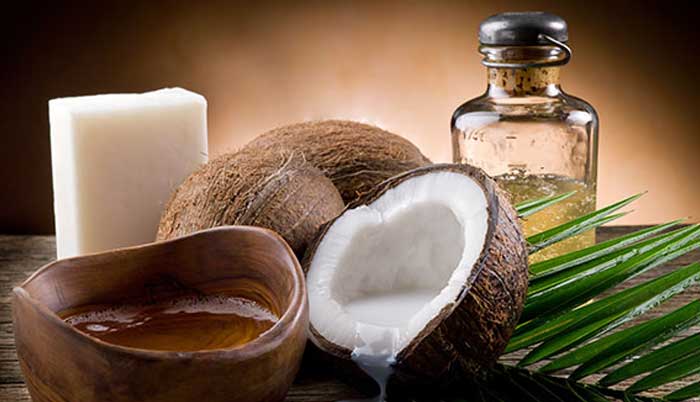![]() Home > Health
Home > Health
Coconut Oil: A Nutritional Powerhouse For Health And Wellness

![]() April 27th, 2025 | 11:01 AM |
April 27th, 2025 | 11:01 AM | ![]() 274 views
274 views
NATURAL NEWS
Coconut oil supports heart health, brain function, hormone balance, blood sugar regulation and immune health due to its MCTs.
It is ideal for cooking, baking and enhancing nutrient absorption. It can also be used to make healthy desserts like chocolate treats and energy bars.
A traditional remedy used in Ayurveda and tropical cultures, coconut oil is rich in antimicrobial MCTs, antioxidants (vitamin E) and healthy saturated fats, debunking past myths about its harm.
The oil can soothe sore throats and treats cold sores, ear infections and Candida overgrowth. It also acts as a stimulant-free appetite suppressant and metabolism booster.
Opt for organic, cold-pressed virgin coconut oil to avoid pesticides and retain nutrients. Avoid hydrogenated versions and prioritize certifications like USDA Organic.
Coconut oil has long been celebrated as one of nature's most versatile superfoods, revered in both traditional medicine and modern nutritional science. From boosting heart health to enhancing skin and hair care, this tropical oil is packed with nutrients that can support overall well-being. But what exactly makes coconut oil special?
Brief history of coconut oil
Coconut oil is a natural fat extracted from the meat of mature coconuts (Cocos nucifera). It is solid at room temperature but melts into a liquid when warmed. Depending on the extraction method, it can be refined or unrefined (virgin coconut oil).
Coconut oil has been a dietary and medicinal staple in tropical regions for thousands of years. Indigenous communities in Southeast Asia, the Pacific Islands and South India have relied on coconuts for food, skincare and even traditional remedies. Historical Ayurvedic texts from India reference its use for supporting digestion, immunity and skin health.
Coconut oil has since gained global popularity beginning in the mid-20th century. But misconceptions about saturated fats have led to a decline in its use in Western diets. Fortunately, recent scientific research has debunked many myths, re-establishing coconut oil as a nutrient-dense superfood.
Nutritional profile and health benefits
Unlike many other cooking oils, coconut oil is primarily composed of medium-chain triglycerides (MCTs), which are metabolized differently than the long-chain fatty acids found in vegetable oils. Here's a breakdown of its key components:
45 to 52 percent lauric acid, a potent antimicrobial and antiviral agent.
Six to 10 percent caprylic acid, a component known for its antifungal and gut-healing properties.
Five to 10 percent capric acid, which can support immune function and energy production.
90 percent healthy saturated fats, which are beneficial when consumed in moderation.
Vitamin E and polyphenols, potent antioxidants that combat free radicals.
For years, coconut oil was unfairly criticized for its saturated fat content, but research now shows its unique fats, namely, medium-chain triglycerides (MCTs), offer health benefits. MCTs like lauric acid are quickly converted into energy by the body, supporting metabolism and weight management. They may also raise HDL ("good") cholesterol, improving heart health while fighting harmful bacteria and viruses. Some studies even suggest brain health benefits, including potential Alzheimer's protection.
However, coconut oil is calorie-dense, so moderation is key. Opt for minimally processed virgin coconut oil, as refined versions may lose some of their beneficial properties during processing. While not a miracle food, coconut oil can be a healthy addition to a balanced diet. (Related: Why virgin coconut oil is superior to highly refined, processed coconut oil.)
Why choose organic
Organic coconut oil is the best and safest choice because non-organic farming practices involve the use of pesticides like glyphosate, which can end up in the oil. While heavy metals (such as arsenic or cadmium) are rare, they can sometimes appear in lower-quality oils.
For the safest coconut oil, look for "Cold-Pressed, Virgin and Organic" to ensure minimal processing and no harmful chemicals. Also check for certifications: Labels like USDA Organic or Non-GMO Project Verified guarantee purity and safety. Most importantly, avoid hydrogenated coconut oil as it contains unhealthy trans fats linked to heart disease.
Culinary uses and recipes to try
Coconut oil has a high smoke point (350 F/177 C for virgin, 400 F/204 C for refined), making it ideal for:
Sautéing and stir-frying (a healthy alternative to canola or vegetable oil)
Baking (replace butter in vegan recipes)
Smoothies and bulletproof coffee (for sustained energy)
Homemade granola and energy bars
Dairy-free ice cream and chocolate treats
Here are some delicious ways to incorporate coconut oil into meals:
Coconut oil fried rice (healthy takeout-style dish)
Sautéed with garlic, veggies and tamari for a gluten-free alternative
Keto fat bombs (energy-boosting snacks)
Made with cacao, nut butter and a dash of sea salt
Golden milk (anti-inflammatory drink)
Blended with turmeric, cinnamon and black pepper
Vegan coconut oil chocolate bars
A dairy-free dessert with pure cocoa and maple syrup
Coconut oil popcorn (a healthier movie snack)
Drizzled with Himalayan salt and nutritional yeast
This story is not medical advice and is not intended to treat or cure any disease. Always consult with a qualified naturopathic physician for personalized advice about your specific health situation or concern.
Source:
courtesy of NATURALNEWS
by Laura Harris
If you have any stories or news that you would like to share with the global online community, please feel free to share it with us by contacting us directly at [email protected]